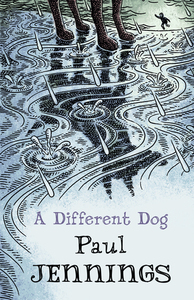Take a photo of a barcode or cover
This was very different for Mr Jennings but I like it.
It is a tale of a boy, two dogs and silence. Losing his voice from one tragedy, it takes another to bring it back.
We find a book about loss, about self, about loneliness, respect and hope.
A Different Dog is a great book for use in the classroom as it has so many themes it should generate a great discussion.
It is a tale of a boy, two dogs and silence. Losing his voice from one tragedy, it takes another to bring it back.
We find a book about loss, about self, about loneliness, respect and hope.
A Different Dog is a great book for use in the classroom as it has so many themes it should generate a great discussion.
adventurous
dark
sad
medium-paced
I have a son who is 4.5 years old and was diagnosed with Selective Mutism at age 3.
In an attempt to search for any books (non-fiction, fiction and reference) I typed in 'selective mutism' into my local library's database. A few options came up, no reference/text books, but mainly adult novels with traumatic mutism themes (traumatic mutism generally happens when a person experiences a significant event that is very distressing for them, such as a car accident, sudden death of a loved one, witnessing an event). My son has a different type of Selective Mutism; it is classified as an anxiety disorder whereby the body/mind 'selects' what environments, situations and circumstances he is mute. An outsider who doesn't know about this disorder in a person may decode their behaviour as shy, quiet, defiant, anti-social as some people with SM don't like to give eye contact, may turn away from the person as a 'safety' and protective mechanism.
So, I was joyful when I found a Paul Jennings book that was tagged as having 'selective mutism themes'. I read it first by myself and have decided that I'm not ready to read it to my 4 year old, mainly due to the explicit reference to the death of the dog and the car accident. At this point in his development, these are heavy topics that would probably bring on some nightmares and night terrors for him.
What I did really like about this book though, and will be beneficial (I hope) for my son in the future, is how the boy describes what he feels and experiences in the situations where he asked a question or talked to by others. It seems that he communicates that he wants to talk and verbalise, but his words are 'stuck'.
"You can't be what you can't see" and so my hope is that in the future, when I feel my son might be ready to deal with the other themes of the book, he can identify with the main character, the character's descriptions of his 'stuck' words / thoughts / feelings and frustrations of his body and mind not allowing him to communicate in a way that he wants to. I want my son to be ok with who he is, as I just know that certain aspects of his life are going to be challenging in the future (i.e. social situations) as he (and his parents) help him to navigate life with strategies to support him and encourage him to share his brilliance in a way that he feels great and contributes to his world.
In an attempt to search for any books (non-fiction, fiction and reference) I typed in 'selective mutism' into my local library's database. A few options came up, no reference/text books, but mainly adult novels with traumatic mutism themes (traumatic mutism generally happens when a person experiences a significant event that is very distressing for them, such as a car accident, sudden death of a loved one, witnessing an event). My son has a different type of Selective Mutism; it is classified as an anxiety disorder whereby the body/mind 'selects' what environments, situations and circumstances he is mute. An outsider who doesn't know about this disorder in a person may decode their behaviour as shy, quiet, defiant, anti-social as some people with SM don't like to give eye contact, may turn away from the person as a 'safety' and protective mechanism.
So, I was joyful when I found a Paul Jennings book that was tagged as having 'selective mutism themes'. I read it first by myself and have decided that I'm not ready to read it to my 4 year old, mainly due to the explicit reference to the death of the dog and the car accident. At this point in his development, these are heavy topics that would probably bring on some nightmares and night terrors for him.
What I did really like about this book though, and will be beneficial (I hope) for my son in the future, is how the boy describes what he feels and experiences in the situations where he asked a question or talked to by others. It seems that he communicates that he wants to talk and verbalise, but his words are 'stuck'.
"You can't be what you can't see" and so my hope is that in the future, when I feel my son might be ready to deal with the other themes of the book, he can identify with the main character, the character's descriptions of his 'stuck' words / thoughts / feelings and frustrations of his body and mind not allowing him to communicate in a way that he wants to. I want my son to be ok with who he is, as I just know that certain aspects of his life are going to be challenging in the future (i.e. social situations) as he (and his parents) help him to navigate life with strategies to support him and encourage him to share his brilliance in a way that he feels great and contributes to his world.
Graphic: Animal death
Moderate: Car accident
adventurous
hopeful
mysterious
medium-paced
Plot or Character Driven:
Plot
Strong character development:
No
Loveable characters:
No
Diverse cast of characters:
No
Flaws of characters a main focus:
Complicated
There's something really refreshing about Paul Jennings quirkiness and unique perspective in his style of writing within his short stories. Following a boy who struggles to speak through the trauma of losing his dog at a young age (you get the impression he holds guilt as he didn't speak up to save him), it takes you on the journey of him and a performing dog he found whilst on his walk up a mountain. It lacked character development and there seemed to be a lot of holes in the story. As always with Paul there's an unexpected twist at the end!
Minor: Animal death
Quite a different story from Jennings here after the ones I have read so far, this one far more intense and dramatic in comparison - again a reasonably well written and entertaining yarn from this geezer.
adventurous
emotional
fast-paced
Plot or Character Driven:
Character
Strong character development:
Yes
Loveable characters:
Yes
Diverse cast of characters:
No
Flaws of characters a main focus:
Yes
adventurous
mysterious
fast-paced
Plot or Character Driven:
Character
Strong character development:
Yes
Loveable characters:
Yes
Diverse cast of characters:
N/A
Flaws of characters a main focus:
Yes
I was raised on Paul Jennings's short story collections, which I'm looking forward to getting reacquainted with this summer, two and a half decades on! But I thought I'd check out his latest works too, namely his three 'A Different...' books. I didn't enjoy this story. I actually found it really unsettling for a reason I can't quite identify. I felt there was a mismatch between the landscape evoked by the writing and the illustrations (Australian bush vs. English countryside) and the whole story seemed overly simplistic. I found it hard to believe that the boy could be so traumatised by losing his dog at age six that he would never speak again. The ending had the characteristic twist I always thrilled to in a Jennings's story; this one in particular reminded me of a story called 'No is Yes' in the Quirky Tails collection. That was the first story that truly sucker-punched me with its ending, but in a good way. Let's see how the other two books are before I return to Jennings in his prime.
Lovely, heart-warming story about a boy who doesn't speak and how his plans to make things better for his struggling single mother go wrong. The dog and the way the boy relates to the dog is the core of the story, especially since the boy cannot speak to people and therefore finds human relationships tricky to maintain. Overall, beautifully done and an easy book to tackle for less confident readers - short chapters, accessible font, clear spacing and great line illustrations all help with this. Strongly recommend this for older kids, teens and above.



